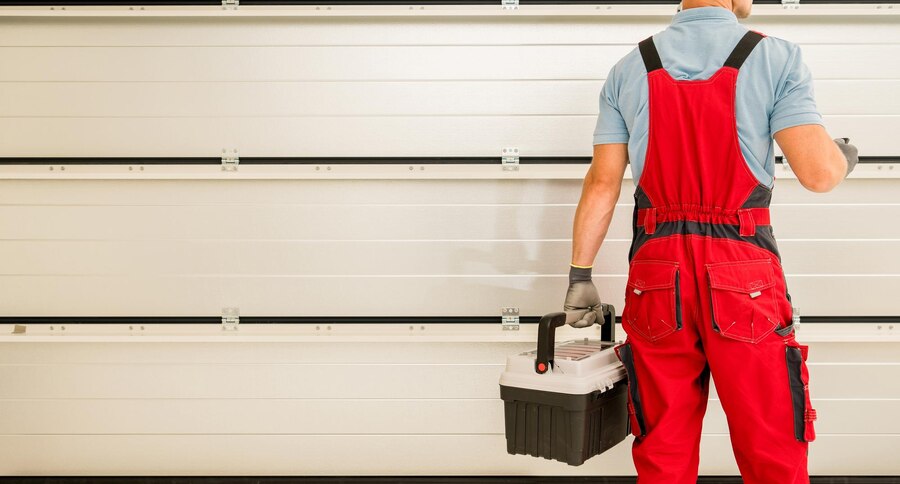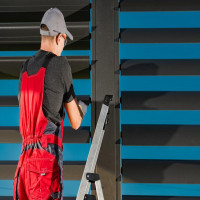How Often Should You Get Your Garage Door Inspected?

Strong 8k brings an ultra-HD IPTV experience to your living room and your pocket.
A garage door is one of the most important moving parts of a home, yet it’s often one of the most overlooked. Whether it's opening to let a vehicle out in the morning or closing at night to secure the home, the garage door is a constant part of daily life. For this reason, routine inspection and maintenance are crucial to ensure long-term functionality, safety, and efficiency.
Homeowners often ask, “How often should a garage door be inspected?” The answer varies depending on usage and environmental factors.
The Importance of Garage Door Inspections
Over time, garage doors are subjected to significant wear and tear. With daily use, parts such as springs, cables, rollers, and openers naturally degrade. An inspection doesn’t just identify obvious damage—it can uncover minor issues that, if ignored, may evolve into serious hazards.
Professional garage door repair technicians often report that most emergency calls could have been avoided with routine inspections. These checkups serve multiple purposes:
Safety: Faulty components can be dangerous, especially high-tension springs or malfunctioning sensors.
Security: A door that doesn’t close or seal properly could leave a home vulnerable to intruders.
Performance: Smooth operation depends on well-maintained moving parts.
Cost Savings: Preventative maintenance costs far less than replacing entire systems.
General Inspection Frequency
Most professionals recommend that homeowners visually inspect their garage doors every 3–6 months and schedule a comprehensive professional inspection at least once per year. However, more frequent checks may be necessary for garage doors that experience high usage or harsh environmental exposure.
Factors that affect inspection frequency include:
Daily Use: Doors used more than four times per day experience accelerated wear.
Climate: Humidity, rain, snow, and temperature swings can all affect the metal and electronic components.
Garage Door Age: Older systems typically require closer attention and more regular checks.
A business providing garage door repair services would usually advise biannual inspections for households that rely heavily on their garage doors, especially if the doors are more than ten years old or have had previous mechanical issues.
What Happens During a Professional Inspection?
When a technician arrives to inspect a garage door, they assess a wide range of components and systems. The goal is not just to fix what’s broken, but to evaluate the overall health of the door and anticipate future problems. Key elements of the inspection include:
1. Visual Inspection
Examining panels for dents, rust, or warping
Looking for loose or missing hardware
Checking track alignment and cleanliness
2. Mechanical Component Evaluation
Testing torsion and extension springs
Checking cables for fraying or wear
Evaluating rollers and hinges for movement and lubrication
3. Operational Test
Opening and closing the door manually and with the opener
Listening for grinding, squeaking, or hesitation
Testing door balance and weight distribution
4. Safety Features
Ensuring sensors are aligned and responsive
Checking auto-reverse mechanism with test objects
Evaluating emergency release function
Businesses in garage door repair emphasize that even a small issue in one of these areas could compromise safety or damage the door if left unresolved.
Signs That a Garage Door Needs Immediate Inspection
Even with regular inspections, issues may arise in between scheduled maintenance. When homeowners notice anything unusual, it’s best to arrange for a prompt evaluation. Common warning signs include:
The garage door won’t open or close completely
Jerking or shaking during movement
Noisy operation, such as grinding or squealing
The door hangs crooked or appears unbalanced
Unresponsive remote or keypad
A well-established garage door repair company will usually recommend addressing these signs immediately, as continued use in such conditions may worsen the problem or cause injury.
DIY Garage Door Maintenance Between Inspections
While professional inspections are essential, homeowners can take several steps to maintain their garage doors throughout the year. Simple do-it-yourself care can keep the system running smoothly and prevent premature failure of parts.
Lubrication
Every few months, apply a silicone-based lubricant to rollers, hinges, springs, and tracks. This reduces friction, prevents rust, and contributes to quieter operation.
Tightening Hardware
Garage doors move hundreds of times each year. Over time, vibration can loosen bolts and screws. A periodic check with a socket wrench can prevent minor issues from becoming serious.
Testing Door Balance
Disconnect the opener and lift the door manually halfway. If it stays in place, it’s balanced correctly. If it falls or rises, a spring adjustment may be needed—something best left to a garage door repair expert due to the danger involved.
Cleaning Tracks
Keeping the tracks clear of debris ensures smooth movement. Avoid using grease, which can cause build-up and attract dirt.
Seasonal Considerations
Weather plays a significant role in how often garage doors should be inspected. In climates with extreme heat or cold, materials may expand, contract, or wear out more quickly. This makes seasonal check-ups particularly valuable.
Winter: Cold temperatures can affect electronic openers and batteries. Ice may form in the tracks.
Summer: Heat can dry out lubricants and cause parts to contract or warp.
Spring/Fall: These are ideal times to schedule professional inspections, as moderate weather makes repairs easier and more efficient.
Some garage door repair providers even offer seasonal tune-up packages that combine inspections with routine maintenance, reducing the risk of weather-related breakdowns.
Benefits of Routine Inspections for Homeowners
Investing in routine inspections may seem like an unnecessary chore to some, but the benefits are clear:
Peace of Mind: Knowing the door is safe, functional, and secure.
Fewer Repairs: Early detection prevents major failures.
Increased Lifespan: Well-maintained systems last longer, providing a better return on investment.
Home Value: A functioning and safe garage door enhances curb appeal and property value.
Businesses focused on garage door repair often remind clients that garage doors are not only entry points but part of a home’s structural integrity. Preventing problems through inspections is always smarter than responding to an emergency.
Conclusion
Garage door repair play a vital role in home safety, convenience, and energy efficiency. Like any frequently used mechanical system, they require regular attention to remain in top condition. Routine inspections—both by the homeowner and a professional—are the key to avoiding major repairs and ensuring reliable performance.
A reputable garage door repair service would encourage homeowners to inspect their systems seasonally and schedule professional assessments at least once a year. Staying proactive not only protects the investment in the garage door but also contributes to a safer, more secure home.
In the long run, a small effort today can prevent costly repairs tomorrow.
Note: IndiBlogHub features both user-submitted and editorial content. We do not verify third-party contributions. Read our Disclaimer and Privacy Policyfor details.


